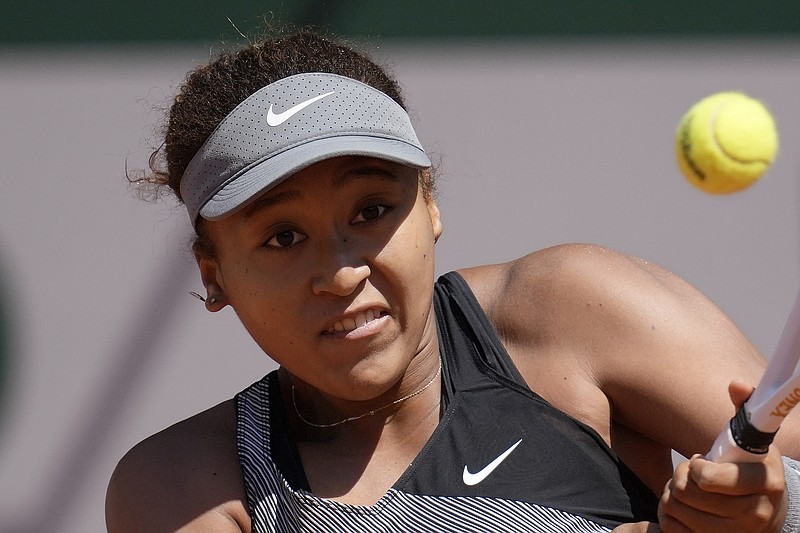First came the news that Naomi Osaka was withdrawing from the French Open because she's unwilling to talk to the media. Then Petra Kvitova, the two-time Wimbledon champ, withdrew from the French on Tuesday after she fell and injured her ankle, in her words, "during my post-match press requirements on Sunday."
When press conferences start contributing to injuries at Grand Slam tennis tournaments, you wonder how long the players will allow such media opps to continue.
But more importantly, does anyone care?
Should they?
Media members, athletes and entertainers in general have always had uncomfortable relationships. Dig too deeply into their private lives - or even their public performances, should those performances be less than impressive - and the journalist is often seen as cruel, insensitive, even unprofessional.
Go the other way and the media person is accused of being soft or a cheerleader for that particular athlete or team.
Few in the media seem to find a balance to keep everyone happy, or at least respectful of their work.
All of which brings us to the unfortunate situation regarding Osaka, the world's No. 2-ranked player who withdrew from the Grand Slam event rather than continue to be fined for not talking to the media, as she had stated she would not do before the tourney ever began.
"The truth is I have suffered long bouts of depression since the U.S. Open in 2018 and I have had a really hard time coping with that," Osaka said in a statement concerning her withdrawal while referencing that emotional Open championship over Serena Williams. "Anyone that knows me knows that I am introverted. I am not a natural public speaker and get huge waves of anxiety before I speak with the world's media."
Anyone who's ever given so much as a book report in the fourth grade can appreciate her issue with speaking to a large group of people.
Then again, according to the New York Times, Osaka is now the world's highest paid female athlete. She earned more than $55 million last year in a global pandemic, almost all of that from endorsements rather than tourney winnings.
Some would say with sponsorship money such as that she can afford not to talk to the media, even routinely paying the $15,000 the French Open was going to fine her for every press conference she refused to attend.
Then again, media coverage, almost all of it favorable, has helped Osaka become wealthy far beyond her years.
But in the case of Osaka, who's but 23 years old, this really isn't about what she has the money not to do. It's apparently about something far more serious, if we're to believe all of this is on the up-and-up. It's about Osaka's mental health, which no one should make light of or criticize.
Or as former pro player and longtime commentator Pam Shriver told the NYT: "The pandemic is still the elephant in the room and has been so hard on so many young people."
The pandemic is the elephant in all our rooms when it comes to our emotional, mental and physical health these days. And numerous studies have confirmed the mental stress and strain our teenagers and young adults have experienced attempting to deal with COVID-19 is often through the roof. And to return to Osaka's statement, she's been dealing with this since 2018, not 2020, when the pandemic began.
Wealth and fame doesn't necessarily protect one from mental struggles. During the pandemic, It may have even made it worse, since it could isolate an international star such as Osaka from much of her inner circle when she may have needed them the most.
Nor has she necessarily played the blame game to this point, save for a single sentence at the close of her social media post about her withdrawal.
Her post read, "I think the best thing for the tournament, the other players and my own well-being is that I withdraw so that everyone can get back to focusing on the tennis going on in Paris. I never wanted to be a distraction and I accept that my timing was not ideal and my message could have been clearer. I'm gonna take some time away from the court now, but when the time is right I really want to work with the Tour to discuss ways we can make things better for the players, press and fans."
To be honest, other than merely releasing a statement from the player at the close of every match or game concerning that player's performance, it's hard to see a way to be easier on the athletes.
Yes, the postgame questions can be mundane, even boring. They can also be repetitive at times because individual organizations want or need a soundbite that may have already been asked, but not by that news organization.
Yet when you're making $55 million a year, it does seem as if you should be able to handle a few awkward moments here and there.
There's also this from Rennae Stubbs, a former No. 1 doubles player and ESPN analyst, who told the NYT, "You cannot allow a player to have an unfair advantage by not doing post-match press. It's time consuming, so if one player is not doing that and others are, that is not equal."
Yet she also added, "But after this, it's time to really take a hard, long look at all of it."
Actually, it's past time for the entire world to take a hard, long look at how we deal with mental health, especially in the wake of a worldwide pandemic. If Osaka's actions significantly further that discussion, that's far more important than whether or not she ever again talks to any of us in the media.
Contact Mark Wiedmer at mwiedmer@timesfreepress.com
